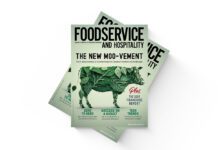By Rosanna Caira
Bashir Munye likes to say he “stumbled into cooking at a training program at the YMCA.” It was 1996, and he was trying to find himself as a young adult. “I was not interested in becoming a lawyer or a politician as my mother had wished upon me.” The decision turned out to be one he’s never regretted, says Munye, adding, “it has been a great journey as a chef.”
Born in Mogadishu, Somalia, in the horn of Africa, a place he refers to as “the land of poets,” he migrated to Italy at the age of six and did his formative academic years outside Rome in the wine region of Castelli Romani. To earn money, he worked in restaurants during the summers as a food runner and bus boy. What he enjoyed the most was the staff meal. “The chef was very generous with the team,” he recalls.
After working in various hospitality roles for the past quarter century, the recently married food activist is now leading a new project at the Black Creek Community Farm as the Developer of Micro Economics. “My duties and responsibilities are the development of culinary shelf-stable products, the branding and the marketing and to support the farm in both generating additional income, while also sharing knowledge with the community at large as we are an education farm as well. This year, he’s produced such products as Nasturtium capers, hot sauce, smoked sumac salt, Nasturtium capers, smoked herb salt, and nasturtium syrup. To minimize food waste, he likes to use all parts of the products grown on the farm.
The greatest reward of working on the farm, is “the amount of knowledge I acquire from the team and the community at large,” says Munye. “Oftentimes we think on how we enrich other people with our knowledge, meanwhile the land and the food grown on it are the biggest contributor to our overall health. Every time I step on the farm, I feel calmer, more grounded and more joyous overall.”
The culinary visionary defines his style of cooking as Nomadic Comfort Food — “rooted in my ancestral Somali Nomadic Heritage and a way of life of adaptability based on environmental stewardship. That philosophy and way of life brought me to do deep and meaningful advocacy work for a more inclusive and just food system, whereby a diverse community supports Ontario agriculture with the intention to grow culturally diverse ingredients such as Okra, ginger, turmeric, as well as determine our own food sovereignty.” His approach to food is simply driven by a reliance on “wholesome locally grown ingredients, focused on exploring the vast cuisine of continental and pan African cuisine.” But he’s also a big believer in the power food has to bring people together to share their stories.
Given that Munye has always been “invested and committed in sustainable agriculture practices and regenerative farming,” this new role seems to be tailor made for him. “I do love and advocate for supporting local farmers (especially BIPOC) but it’s critical to also understand the systemic barriers that prevent most people to do so — colonization, capitalism, consumerism and systemic poverty. It’s difficult to expect a young cook to meaningfully support local ingredients when they’re paid minimum wage and rent is 60 to 70 per cent of their income with a food budget of $200 a month.”
He admits being an activist has always been part of his DNA. “Food is very political and absolutely worth fighting for. As humans, we all have some elements of advocacy and activism we take into in our lives; mine is driven by the desire to make systemic changes to create a more equitable food space.”
Always eager to learn, Munye says he’s “been blessed and privileged to have different mentors in his life — from immediate family members, chefs and food advocates who have shaped him into the person that he is today. But he also adds, that “Often, our identity is determined based on what we do. I feel people are more complex than just their title or work space.”
In addition to working at the Community Farm, Munye is also the founder of a supper club called Nomadic Supper Club, which explores Africa’s vast culinary regions, mixed with his family’s Somali background and Italian upbringing. He also serves as a consultant to various companies. Earlier this year, he was part of the Black Pavilion at the Restaurants Canada show, highlighting Black-owned businesses, where he exhibited some of the products he’s been producing at the farm.
As someone who’s held various roles throughout his 25 years as a chef, Munye feels more grounded today. “Most roles in my 25 years as a chef were focused in the hospitality sector in cooking and managing restaurants, catering and hotels. This role allows me to re-connect with food and community in a more meaningful and dignified way.” Having worked as an educator, most recently at George Brown College, the chef is a strong believer that young cooks, should be exposed to local farmers in order to have a better understanding of where their food is grown and to better know the people who produce it. He feels blessed he gets “paid everyday to learn from the land, the team and the community. I feel like a kid at a candy store with the abundance of gifts that is given to me.”
While our understanding of food continues to evolve, he’s optimistic by the ongoing “micro conversations around environmental sustainability as well as the dialogues and conversations around race and gender disparity.”
As a chef, he’s always been acutely aware of the importance of the supply chain, but now as a supplier, he also understands the importance of keeping it real. “I would love to sell the idea that all my food comes directly from the farm or all my food is ethically sourced, but I find myself having to choose to get produce in a variety of ways — independent and locally driven stores like Fiesta Farm or local farmers that can give me a deal for bulk ingredients that I can purchase with extended family.”
Though he’s happy to be cultivating success on the land, the father of two (aged 25 and 17) is planning to move back to Somalia in a couple of years “to develop an agri-tourism centre, rooted in ancestral knowledge, where we can exchange knowledge and build relationships around food justice.”


















